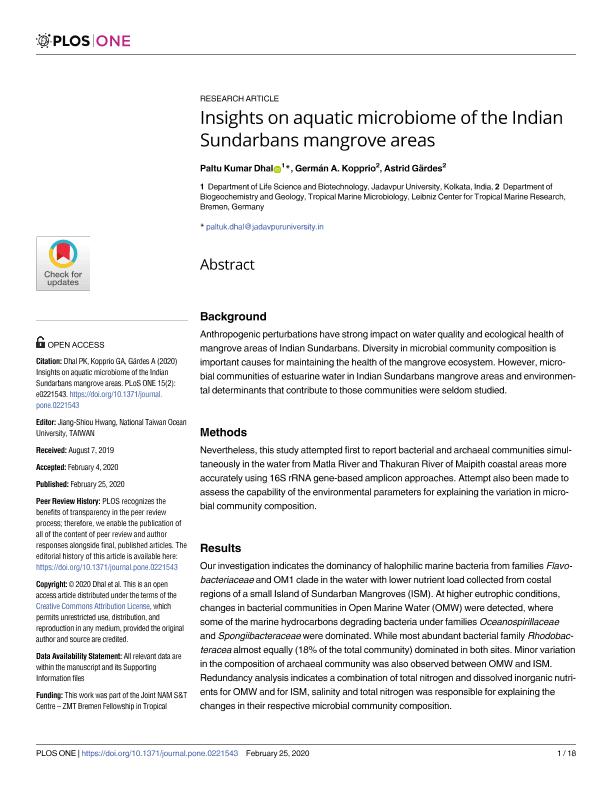Artículo
Insights on aquatic microbiome of the Indian Sundarbans mangrove areas
Fecha de publicación:
25/02/2020
Editorial:
Public Library of Science
Revista:
Plos One
ISSN:
1932-6203
Idioma:
Inglés
Tipo de recurso:
Artículo publicado
Clasificación temática:
Resumen
Background: Anthropogenic perturbations have strong impact on water quality and ecological health of mangrove areas of Indian Sundarbans. Diversity in microbial community composition is important causes for maintaining the health of the mangrove ecosystem. However, microbial communities of estuarine water in Indian Sundarbans mangrove areas and environmental determinants that contribute to those communities were seldom studied. Methods: Nevertheless, this study attempted first to report bacterial and archaeal communities simultaneously in the water from Matla River and Thakuran River of Maipith coastal areas more accurately using 16S rRNA gene-based amplicon approaches. Attempt also been made to assess the capability of the environmental parameters for explaining the variation in microbial community composition. Results: Our investigation indicates the dominancy of halophilic marine bacteria from families Flavobacteriaceae and OM1 clade in the water with lower nutrient load collected from costal regions of a small Island of Sundarban Mangroves (ISM). At higher eutrophic conditions, changes in bacterial communities in Open Marine Water (OMW) were detected, where some of the marine hydrocarbons degrading bacteria under families Oceanospirillaceae and Spongiibacteraceae were dominated. While most abundant bacterial family Rhodobacteracea almost equally (18% of the total community) dominated in both sites. Minor variation in the composition of archaeal community was also observed between OMW and ISM. Redundancy analysis indicates a combination of total nitrogen and dissolved inorganic nutrients for OMW and for ISM, salinity and total nitrogen was responsible for explaining the changes in their respective microbial community composition. Conclusions: Our study contributes the first conclusive overview on how do multiple environmental/ anthropogenic stressors (salinity, pollution, eutrophication, land-use) affect the Sundarban estuary water and consequently the microbial communities in concert. However, systematic approaches with more samples for evaluating the effect of environmental pollutions on mangrove microbial communities are recommended.
Palabras clave:
WATER QUALITY
,
WETLAND
,
BACTERIA
,
ARCHAEA
,
NUTRIENT
Archivos asociados
Licencia
Identificadores
Colecciones
Articulos(IADO)
Articulos de INST.ARG.DE OCEANOGRAFIA (I)
Articulos de INST.ARG.DE OCEANOGRAFIA (I)
Citación
Dhal, Paltu Kumar; Kopprio, Germán Adolfo; Gärdes, Astrid; Insights on aquatic microbiome of the Indian Sundarbans mangrove areas; Public Library of Science; Plos One; 15; 2; 25-2-2020; 1-18
Compartir
Altmétricas




